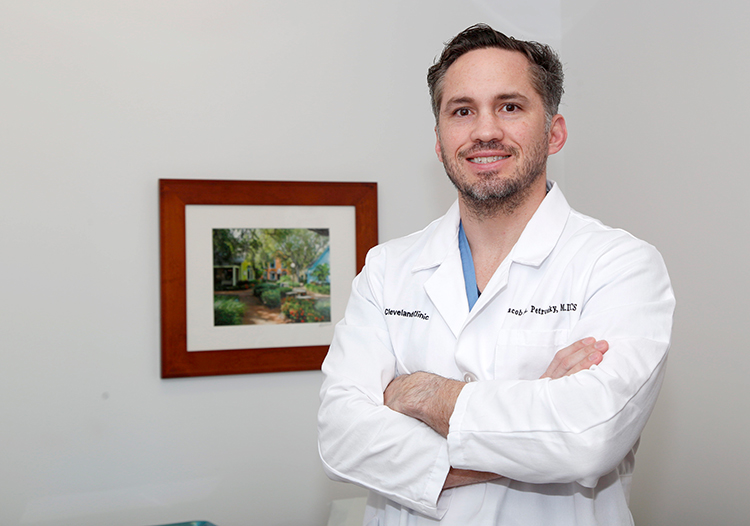
Cleveland Clinic Indian River Hospital recently recruited Dr. Jacob Petrosky to reboot the hospital’s bariatric program, which had been dormant for a year and a half.
Dr. Petrosky told Vero Beach 32963 he chose the specialty of bariatric surgery because he saw an opportunity to have a powerful impact of patients’ health, helping them multiple aspects of their lives.
While most of us think of bariatric surgery as a last-ditch effort to lose weight, the procedure has proven beneficial in the treatment and cure of weight-related conditions such as diabetes, high blood pressure, joint pain and heart disease.
Weight loss surgery is, in fact, the most effective treatment for diabetes. It helps people get off insulin because a lot of insulin resistance and high blood sugar are related to the excess weight.
A Swedish study published in the New England Journal of Medicine concluded that bariatric surgery was associated with lower overall mortality than usual obesity care. In middle-aged patients with severe obesity, life expectancy was approximately three years longer among patients who underwent surgery than among those who received other care.
Typically, bariatric surgery is done only after a patient has tried to lose weight through diet and exercise. Bariatric surgery could be an option if your body mass (BMI) is 40 or higher and you have no weight-related health conditions like high blood pressure, diabetes or high cholesterol; or if your body mass index is 35 or higher and you have high blood pressure, type 2 diabetes or pre-existing conditions like a heart attack. Because those patients have higher risk factors, the weight criteria is lowered. There is no age restriction for the procedure.
“The average age of our bariatric patient is 65,” said Dr. Petrosky. “That’s in part because Medicare approves the procedure while some insurances do not. These patients have thought about it for years and are ready for a permanent solution to their weight problem.”
Gastric bypass surgery has been around since the 1960s. During the procedure, the surgeon creates a pouch from the top of the stomach about the size of an egg, brings the small intestine up and creates a new connection bypassing the stomach. Food can only go into the pouch that holds about an ounce of food verses the stomach that held 3 pints of food. Food bypasses most of your stomach and the first intestine and instead enters directly into the middle part of the intestine. The patient feels fuller quicker and eats less. While the stomach is no longer storing food, it still produces hormones for digestion.
“Since the introduction of the newer laparoscopic sleeve gastrectomy, we do fewer gastric bypass surgeries,” explained Dr. Petrosky. “During the sleeve gastrectomy we remove 75 percent to 85 percent of the stomach, creating a small banana-shaped pouch for the sleeve.
“That remaining part of the stomach still functions like a regular stomach. This allows the patients to feel fuller with smaller meals and reduces hunger hormones that their stomach generates. The advantage to this procedure is that it is a lower risk of complications and no rerouting of the intestines.”
Dr. Petrosky described the part of the stomach that is removed to be about the size of a medium-sized Nerf ball. Since the stomach compresses down when it’s empty, he is able to extract it through a small 1-inch incision. Some patients ask him to take a photo of it when it’s removed, and he’ll fill it up with air to show them how big their stomach can expand. He jokingly said that’s always a hit with his patients.
The type of surgery best for you will depend on your specific situation including your body mass index, eating habits, other health issues and previous surgeries.
“I use robotic surgery whenever possible because it is more precise,” Dr. Petrosky said.
“Robotic surgery takes me from being a two-handed surgeon to being a four-handed surgeon.”
In most cases, patients spend very little time in the hospital. Ninety percent of sleeve surgery patients and 50 percent of gastric bypass patients go home the next day; 90 percent of the gastric bypass patients will be home within two days.
“Staying active and walking are the two most important things a bariatric patient can do to recover quickly and keep the weight from coming back,” Dr. Petrosky continued. “This surgery is so fined tuned that it’s turned into a science and the recovery time is minimal.
“The keys to good health after the surgery include a daily multi-vitamin with vitamin D and calcium, and sticking to a high-protein, low-carbohydrate diet. The patient will stay on a liquid diet for 10 days prior to surgery to shrink the liver and for 10 days after the surgery. During that time, they can drink protein shakes and anything they can pour into a water bottle.
“If someone has tried unsuccessfully to lose weight through diet and exercise, I encourage them to reach out and schedule a consultation. There are a lot of myths surrounding bariatric surgery and many patients aren’t aware of the many ways weight loss surgery is a game-changer that can drastically improve their quality of life. Feel free to call Vicky, our office coordinator and certified bariatric nurse, and she’ll review your entire health history. If you want more information, you can attend an orientation and we’ll check into your insurance benefits and help you navigate the requirements for insurance coverage.”
Dr. Jacob Petrosky received his medical degree from Kansas University Medical Center School of Medicine and completed his internship in general surgery from Mount Carmel Health in Columbus, Ohio. After completing his residency at Cleveland Clinic Foundation in Ohio he went on to complete a fellowship in Bariatric/MIS Surgery and Advanced Endoscopy MIS at Geisinger Health System in Danville, Pennsylvania. His office is located in the Cleveland Clinic Indian River Hospital Health and Wellness Center, 3450 11th Court in Vero Beach. Call 772-770-0323 to schedule a consultation.



